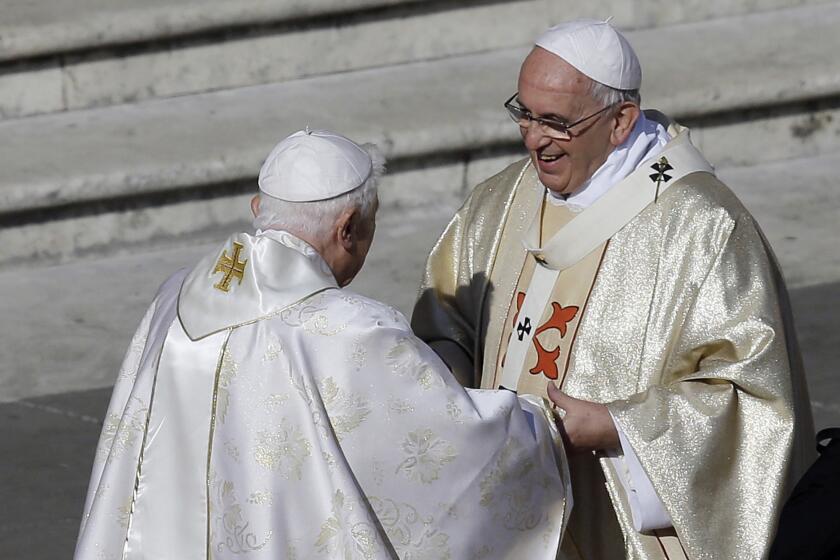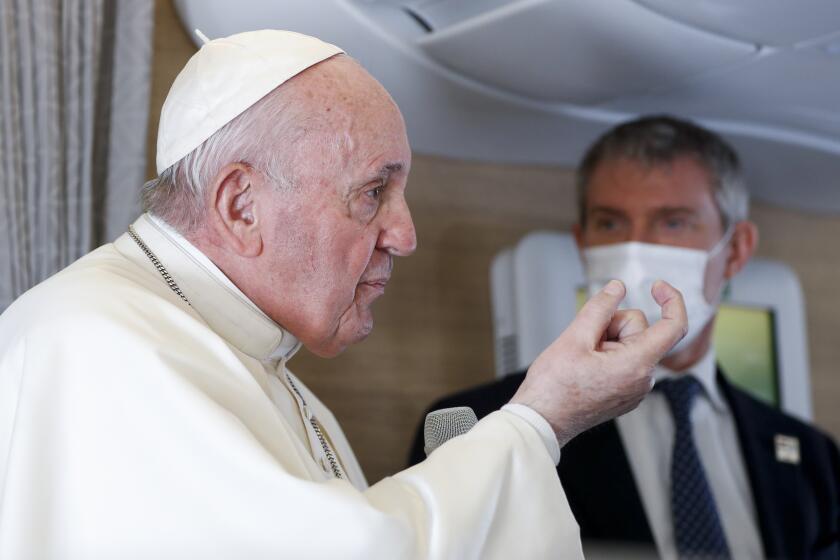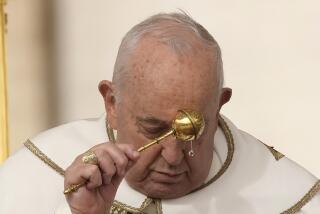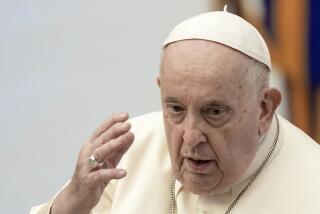Pope to urge Christian-Muslim dialogue in first papal visit to Bahrain
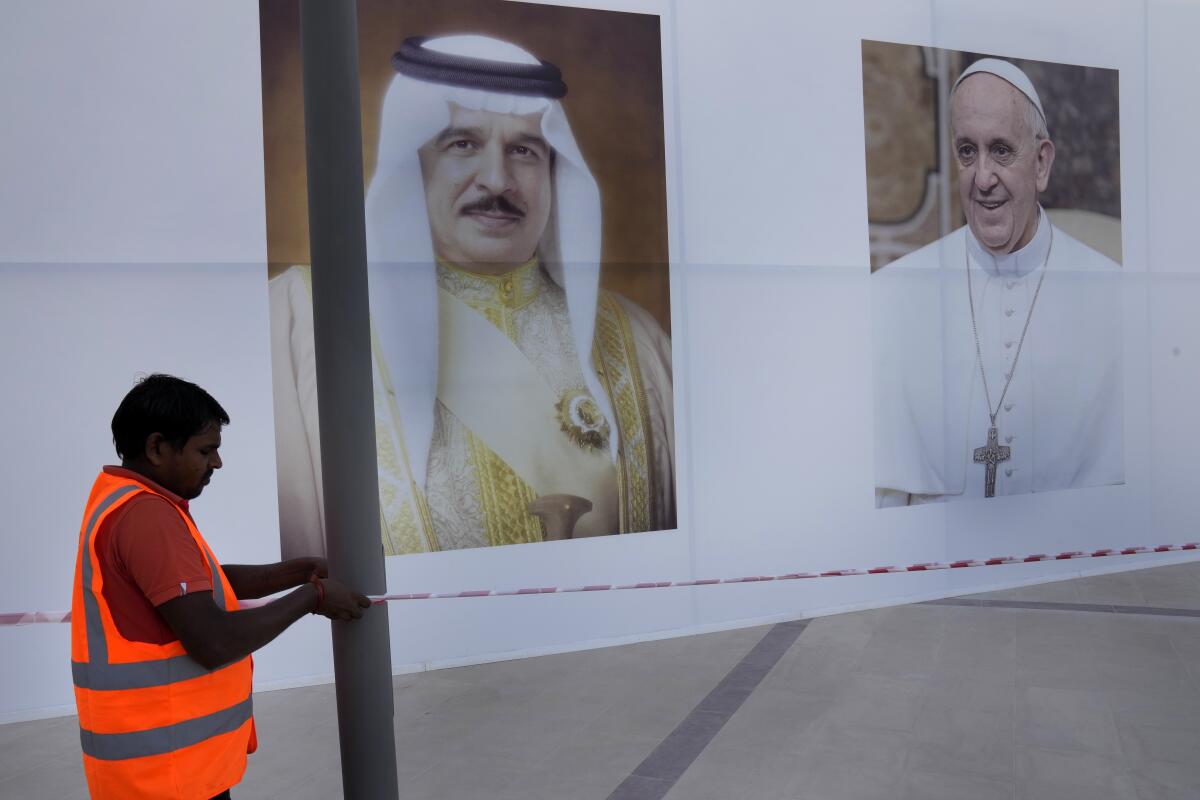
AWALI, Bahrain — Pope Francis on Thursday brought his message of dialogue with the Muslim world to the kingdom of Bahrain, where the Sunni-led government is hosting an interfaith conference on East-West coexistence even as it stands accused of discriminating against the country’s Shiite majority.
Human rights groups and relatives of Shiite activists on death row have urged Francis to use his visit, which begins Thursday, to call for an end to the death penalty and political repression in Bahrain. But it’s not clear if Francis will publicly embarrass his hosts during his four-day visit, the first of any pontiff to the island nation in the Persian Gulf.
The 85-year-old pope, who has been using a wheelchair for several months because of strained knee ligaments, said Thursday that he was in “a lot of pain” as he headed to Bahrain, and for the first time remained seated to greet journalists traveling with him rather than walk down the plane’s aisle.
He arrived at the desert Awali air base to little fanfare and went immediately into a private meeting with Bahrain’s King Hamad bin Isa Khalifa at the airport before the official welcome ceremony.
Francis has long touted dialogue as an instrument of peace and believes a show of interfaith harmony is needed, especially now given Russia’s war in Ukraine and regional conflicts, such as in Yemen. On the eve of the trip, Francis asked for prayers for the trip to promote “the cause of brotherhood and of peace, of which our times are in extreme and urgent need.”
The visit is Francis’ second to a Gulf Arab country, following his 2019 landmark trip to Abu Dhabi, where he signed a document promoting Roman Catholic and Muslim fraternity with a leading Sunni cleric, Sheikh Ahmed Tayeb. Tayeb is the grand imam of Al-Azhar, the seat of Sunni learning in Cairo. Francis followed that with a 2021 visit to Iraq, where he was received by Grand Ayatollah Ali Sistani, one of the world’s preeminent Shiite clerics.
Francis will meet again this week in Bahrain with Tayeb, as well as other prominent figures in the interfaith field who are expected to attend the conference, which is similar to one hosted last month by Kazakhstan that Francis and Tayeb also attended. Members of the regional Muslim Council of Elders; the spiritual leader of the world’s Orthodox Christians, Patriarch Bartholomew; a representative from the Russian Orthodox Church; and rabbis from the United States are all expected, according to the Bahrain program.
Francis denied he was planning to retire anytime soon but repeated that ‘the door is open’ after Pope Benedict XVI took that historic step in 2013.
The trip will also allow Francis to minister to Bahrain’s Catholic community, which numbers around 80,000 in a country of around 1.5 million. Most are workers from the Philippines and India, though trip organizers expect pilgrims from Saudi Arabia and other neighboring countries will attend Francis’ big Mass at the national stadium Saturday.
Bahrain is home to the Gulf’s first Catholic Church, the Sacred Heart parish, which opened in 1939, as well as its biggest one, Our Lady of Arabia Cathedral. The latter, with a capacity of 2,300, opened last year in the desert town of Awali on land gifted to the church by the king. The king presented Francis with a model of the church when he visited the Vatican in 2014 and extended the first invitation to visit.
Francis will visit both churches during his visit and is likely to thank the king for the tolerance the government has long shown Christians living in the country, particularly when compared with neighboring Saudi Arabia, where Christians cannot openly practice their faith.
“Religious liberty inside Bahrain is perhaps the best in the Arab world,” said Bishop Paul Hinder, the apostolic administrator for Bahrain and other Gulf Arab countries. “Even if everything isn’t ideal, there can be conversions [to Christianity], which aren’t at least officially punished like in other countries.”
Pope Francis says he weighed the coronavirus risks of his visit to Iraq and decided to go ahead out of a belief in God’s protection for the faithful.
But in the run-up to his visit to Bahrain, Shiite opposition groups and human rights organizations have urged Francis to focus attention on human rights violations against the majority Shiites by the Sunni monarchy. They urged him to call for an end to the death penalty and request a visit to the country’s Jau prison, where hundreds of Shiite activists have been jailed.
Human Rights Watch and Amnesty International have repeatedly denounced the use of torture in prisons, as well as forced confessions and “sham trials” of dissidents.
“We are writing to appeal to you as the families of twelve death row inmates who are facing imminent execution in Bahrain,” read a letter from the families to Francis released this week by the Bahrain Institute for Rights and Democracy. “Our family members remain behind bars and at risk of execution despite the clear injustice of their convictions.”
Francis has changed church teaching to declare the death penalty inadmissible in all cases. He has regularly visited prisoners during his foreign trips, though no such prison visit is planned in Bahrain.
The Vatican spokesman declined to say whether Francis would raise Bahrain’s human rights record publicly or privately during his visit.
More to Read
Sign up for Essential California
The most important California stories and recommendations in your inbox every morning.
You may occasionally receive promotional content from the Los Angeles Times.
